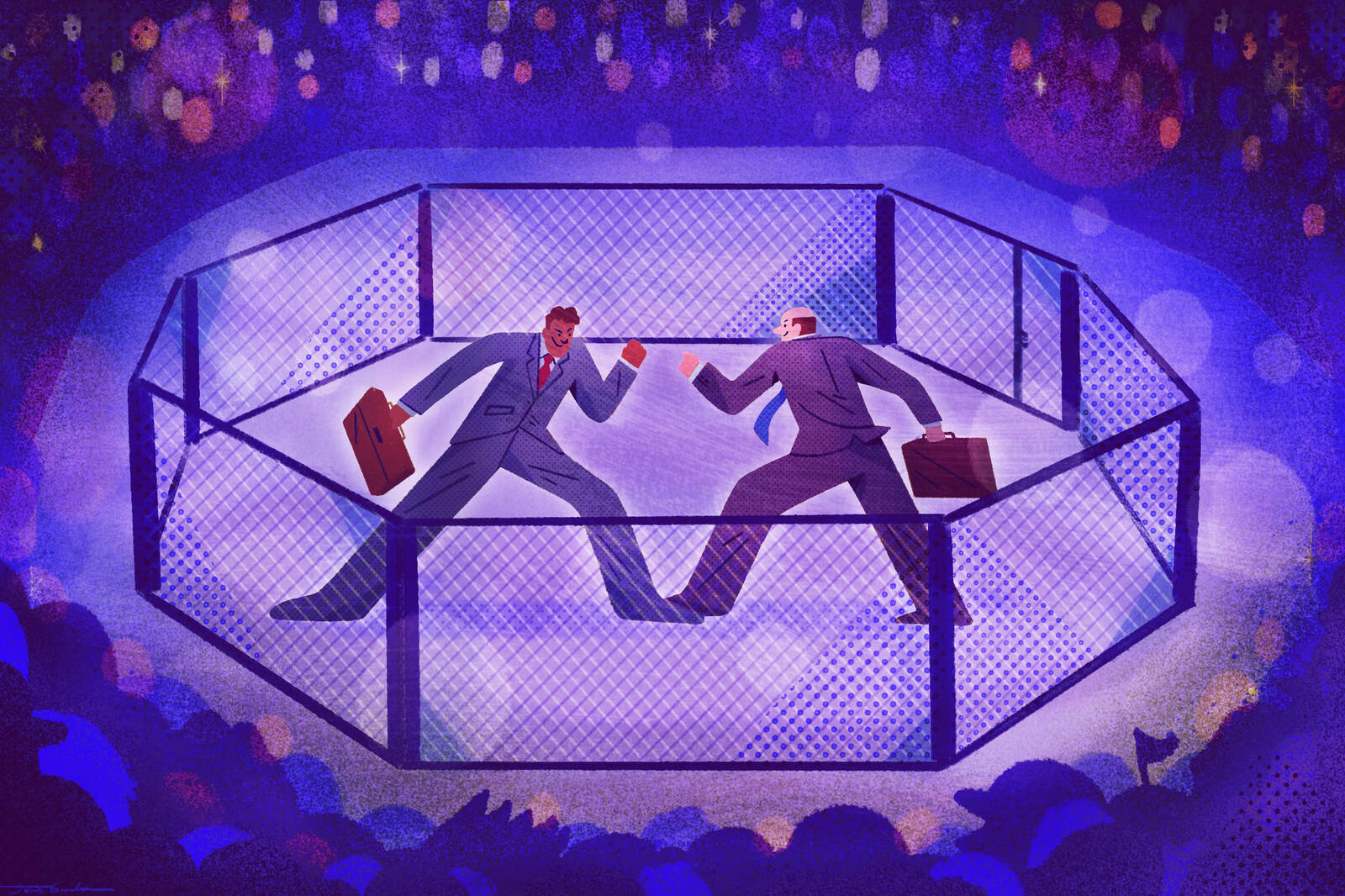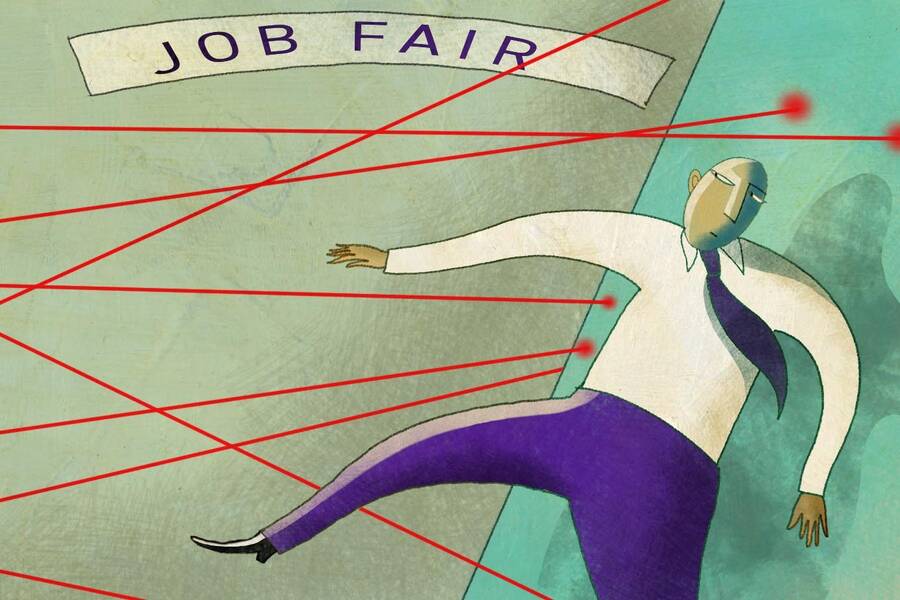Policy Organizations Feb 23, 2024
What’s at Stake in the UFC Antitrust Case?
The outcome of the mixed-martial-arts saga could have wide-ranging implications for the future of global sports entertainment.

Jesús Escudero
In January 2024, a federal judge cleared the way for a $1.6 billion class-action lawsuit to proceed against UFC (Ultimate Fighting Championship), the Las Vegas–based mixed-martial-arts (MMA) company.
In the suit, a group of about 1,200 fighters active between 2010 and 2017 sued for lost wages, accusing the company of using a variety of illegal tactics to drive down their pay. At issue is whether UFC exploited its alleged dominance in luring top-level MMA fighters to give rival MMA promoters little access to enough elite athletes to compete.
This is a landmark case for a sport that has gone from a niche entertainment with a brutal reputation (late U.S. Senator John McCain called it “human cockfighting”) to become one of the fastest-growing spectator sports in the world.
In the immediate term, the trial may hurt the bottom line at TKO Group, born of a recent merger between UFC and WWE (World Wrestling Entertainment), the professional wrestling organization.
But in the longer term, the case could have wide-ranging implications for a variety of athletic arrangements going forward.
“There’s no question that the rise of sports-as-entertainment has fueled antitrust scrutiny,” says R. Mark McCareins, a clinical professor of business law at the Kellogg School. From debates about the treatment of college athletes to discussions over pay equity in women’s soccer and the WNBA, “there’s been a renewed emphasis on wages, salaries, and playing conditions for all athletes.”
Here’s what’s at stake—and what McCareins will be looking for as the case unfolds.
Fighters looking for an increased share of the pie
The plaintiffs in the UFC case argue that the UFC is a monopsony that uses its size and clout to lock up a critical mass of top-level MMA fighters through unfavorable contracts. Particularly objectionable to plaintiffs are the non-poach and noncompete clauses in the fighters’ contracts.
“They come up to you before the fourth fight and say, ‘Here’s a new contract. Sign it or you are going to get a terrible fight for your fourth fight,’” an attorney for the plaintiffs told Bloomberg Law.
“This is no different than how a major airline would deal with its ‘rookie’ commercial pilots,” McCareins says. “They say, ‘You need to fly a designated number of hours in the cockpit of a regional carrier before we let you assume the controls of a 747 and we will compensate you less until you establish your credentials.’”
Plaintiffs have alleged that these types of contractual restrictions have allowed the UFC to pay athletes under market value. In most major sports leagues like the NBA and the NFL, about half of the league’s total revenues go toward players’ salaries, although the players in these leagues are unionized and their wages and benefits negotiated under collective bargaining agreements. With the UFC, the fighters’ share is approximately twenty percent of gross event revenues. But UFC fights are event-based promotions, not team-based sports like the NBA’s and NFL’s, so the UFC absorbs all production and event-creation costs, making revenue-sharing comparisons apples-to-oranges.
In the case, UFC will argue that it has expanded opportunities for all MMA fighters by making significant investments—including lobbying to get states to authorize the fights and insuring the fighters—to “professionalize” the sport. In addition, while plaintiffs allege a U.S.-only geographic market, the UFC asserts that its fighters come from throughout the world and that it competes with MMA promoters well beyond the borders of the U.S.
“Just as in the Google antitrust case, they’ll say, ‘We’re not a monopsony,’” McCareins says. “They will argue that it grew to that position through pro-competitive means—by innovating and developing a superior product.”
The UFC will also argue that it provides merit-based compensation to its fighters in addition to the substantial endorsement monies that the fighters earn by using the UFC platform to promote their brand. Further, unlike any stagnant monopsony comparisons, UFC wages to fighters have increased as the number of staged events—and its revenues—have skyrocketed.
“Monopolists are allowed to compete aggressively,” McCareins says. “If it’s decided that the UFC has used ‘superior skill or business acumen’ to build a successful company, the Sherman Act would not necessarily condemn their contractual restrictions with their fighters. Under the Sherman Act, even monopolists are not required to ‘cooperate’ with—or create a level playing field for—their rivals.”
Even the alleged anticompetitive noncompete clauses that UFC has with its fighters have withstood legal challenges and are generally lawful if reasonable in scope and duration.
A rise in global competition
But even as the case winds through the court system, the conditions on the ground are changing rapidly.
For one, the UFC competes with worldwide entities for the hiring of top MMA talent and that global competition is increasing, with Saudi Arabia investing up to $100 million in Professional Fighters League (PFL), one of UFC’s rivals.
“There’s no question that the rise of sports-as-entertainment has fueled antitrust scrutiny. There’s been a renewed emphasis on wages, salaries, and playing conditions for all athletes.”
Critics have argued that deal is part of the kingdom’s “sportswashing” strategy, with which it hopes to obscure its human-rights record through major investments in sports with global appeal including soccer, Formula One, boxing, and golf. Whatever it is, it appears to be working. LIV Golf, the Saudi-funded league, enticed top golfers away from the PGA tour with enormous contracts. The PGA initially responded by banning LIV-affiliated players from its tour but eventually backed down and agreed to a possibly ill-fated merger.
“LIV has been more successful than most people thought,” McCareins says. “So what’s to stop the Saudis from doing with UFC fighters what LIV did with golfers?”
The LIV golf situation is strong evidence that the barriers to entry in the professional MMA industry negate the suggestion that the UFC is a classic antitrust monopsony.
The odds of the Saudis’ strategy working are particularly favorable for sports like UFC, where athletes compete as individuals (as opposed to teams), and audiences are international.
“American football doesn’t have global appeal,” McCareins says, “so you won’t see a Saudi-backed NFL clone anytime soon. But the product offered by the UFC does present an opportunity for entry by foreign firms.”
The impact of sports betting on the future of athletes’ pay
The class-action lawsuit against UFC is occurring against the backdrop of another big change: sports gambling.
In the last six years, 38 states have legalized some form of sports gambling, with more than half of states now allowing fans to place bets online. In response, major American sports leagues like the NBA, NFL, and MLB, which had long discouraged fans from betting on games out of fears that players or officials may manipulate outcomes to bettors’ benefit, reversed course and instead began to collaborate on sponsorship deals with gambling companies.
“As soon as states like Illinois started making it legal, the league owners started cutting deals with the FanDuels of the world, granting access to their intellectual property—their logos and names,” McCareins says. “In return, they got a percentage of the revenue from betting sites.”
According to the American Gaming Association, revenue from betting on sports in the U.S. reached $7.5 billion in 2022—and UFC is well-poised to take advantage of this growth. As one UFC executive points out, the league presents more than 500 bouts per year, during events that span several zones and have no off-season, all features that are attractive with bettors.
While the issue of gambling revenues hasn’t surfaced in the UFC litigation, it is another source of income that the league—and many others—will need to account for as athletes look to ensure they are properly compensated for their labor.
Going forward
The most obvious consequences of a win by the UFC athletes would be a shift in negotiating power away from the promotion firms in favor of the athletes.
“The UFC antitrust plaintiffs are seeking to gain an outcome through a court action that would otherwise be sought through the unionization and collective-bargaining process,” McCareins says. “However, since the fighters are independent contractors, the traditional union approach is not available to them.”
“If UFC ultimately loses this injunction action, it may change the way they conduct business, as far as exclusive contracts go,” McCareins says. “Other sports that have nonunionized independent contractors, including the golf and tennis tours, might be very concerned with the outcome here.”
The win could lead to additional lawsuits against other sports leagues. For example, NASCAR is currently facing some of the same allegations. It could also spur athletes, particularly independent contractors, to demand more control over when and how they compete, as well as how their image and career are promoted.
But regardless of the outcome, McCareins doesn’t see the recent emphasis on fair labor practices in the entertainment business going away anytime soon. In that sense, the UFC antitrust litigation mirrors compensation debates in the worlds of movies, television, and live music performances.
“I think there will continue to be pressure on successful companies to share a greater percentage of the pie with actors, entertainers, fighters, and athletes of all kinds.”
Andrew Warren is a writer based in Southern California.



